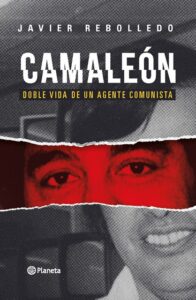
The case of Chilean journalist Javier Ignacio Rebolledo Escobar, who faces a possible prison sentence for injuria (defamation), may have negative effects on press freedom in the South American country.
The complaint, in which Rebolledo Escobar is accused of defamation and for which he could serve a sentence of up to three years imprisonment, concerns the journalist’s most recent book “Camaléon: doble vida de un agente comunista” (Camaléon: double life of a communist agent), published in August 2017. The family of a former official sentenced for crimes against humanity committed during the dictatorship of Augusto Pinochet (1973-1990) filed the complaint and the journalist has his first hearing on Aug. 16.

Javier Ignacio Rebolledo Escobar. (Courtesy photo)
Javier Ignacio Rebolledo Escobar. (Courtesy photo)
The book is about the life of Mariano Jara, a man who camouflaged himself in the world of the Chilean right, but who really fulfilled the mission of protecting and keeping the weapons of the Communist Party. While Jara kept 80 tons of weapons, which were used in the near fatal attack against Pinochet, among other things, he spent his nights in the company of famous comedians, singers and vedettes from Santiago, according to the book.
According to Rebolledo, Jara told him that in order to create that character, he approached Raúl Quintana Salazar "who was a political relative." Quintana Salazar was an agent of the intelligence service of the country, then called DINA (National Intelligence Directorate), who is currently in Punta Peuco prison, an exclusive precinct for uniformed men. His daughter filed the complaint against the journalist, Rebolledo explained to the Knight Center.
Rebolledo, who has spent more than 13 years covering human rights violations during the Chilean dictatorship for different media outlets and now as an editorial author, heard about Quintana Salazar when he wrote an earlier book based on testimonies of people who survived torture. On that occasion, Rebolledo's investigation led him to become familiar with judicial statements in which a witness stated that he had seen him torturing a woman.
The publication of this torture allegedly committed by Quintana Salazar is one of the events in the book that the family of the former agent found injurious and for which it filed the complaint against Rebolledo.
For Rebolledo it was a surprise when on July 18 he learned that there was a lawsuit against him. The notice he received called him to a hearing on August 16 with a warning that he could be taken by force if he doesn’t attend.
When searching for information, he found that the complaint had been filed on April 30 and that the Eighth Court of Guarantee of Santiago had declared it inadmissible on May 8.
In a three-page resolution, the court determined, "just from the analysis of the events exposed in the libel analyzed, it is clear that such events do not constitute an offense."
Regarding the description of the torture of the woman, the court determined that it did not constitute the offense of injuria because "there is no direct attribution, rather the telling of what another person said” and the accusers don’t question the existence of this statement, but the value it had in the courts.
The suit against Javier Rebolledo concerns his most recent book "Camaleón."
After the decision declaring the complaint inadmissible, the accusing party appealed. On June 13, the Court of Appeals pointed out in a paragraph that this was admissible considering that “the events that give rise to the complaint may constitute an offense.”
“All citizens have the right to take legal action, including him. And it's something that I respect in my judicial system because it's part of the Republic in which I live," Rebolledo assured the Knight Center. "But I find it unacceptable that the court of origin [...] received it and dismissed it in all its parts. It is a long judicial decision that declared the complaint inadmissible. It said this is not injuria, not even potentially. However, [...] the appeals court surprisingly pointed out that it differed from the court of origin and said the complaint was admissible. And that is what has me facing the possibility of prison."

The suit against Javier Rebolledo concerns his most recent book "Camaleón."
As Paulo Olivares, one of the journalist's lawyers, explained to the Knight Center, despite the fact that the crime for which Rebolledo is accused is in the criminal sphere (with possible prison terms), it is classified as “private criminal proceedings." This permits there to be a kind of conciliation between the parties during the first hearing, as in a civil case. If that doesn’t happen, there could be a criminal trial.
“We are convinced that Javier will be acquitted," Olivares said. "But it seems to us that this situation could not be left that way. It is necessary to call attention, so that as it has been in the majority of cases, the rigor to admit a complaint has higher standards [...] if not, there is a potential attack against the freedom of expression because it ends up intimidating not only the one who allegedly carried out the injuria, but the people in general or journalists in general."
The case has not gone unnoticed in Chile, nor for organizations defending press freedom at an international level, which have called for the decriminalization of defamation, for those cases to be judged by civil law and not criminal law.
The Chilean Journalists Association rejected the decision of the Court of Appeals and indicated that it will accompany Rebolledo in this judicial process. The Press and Soc Chilean authorities to "immediately drop all criminal proceedings
The Committee to Protect Journalists (CPJ) urged Chilean authorities to "immediately drop all criminal proceedings” against Rebolledo and said, “lawmakers should act swiftly to repeal all criminal defamation laws.”
For the same day of the hearing, the Network of Journalists of Chile has scheduled the discussion "Injuria and Prison" to address "the eventual restrictive effects of this law on the exercise of journalistic work," Paulette Desormeaux, executive director of this network, told the Knight Center.
The response he has seen in these organizations in the country and beyond has meant moral support for Rebolledo.
“At the beginning I felt very bad, a sense of being orphaned, of being in 2018 doing your job, trying to do it in the best way, and finding that a human rights violator who is in prison for the same crimes that you are denouncing can imprison you. I felt an ugly intimidation at the time," Rebolledo said. "And the truth is that the international response, regardless of whether I have sought it or not, has also been very satisfactory, solidarity is good for me."
The lawyer of the accuser pointed out that there is a "media intimidation" for the support that these organizations have shown to the journalist, according to a brief sent to the court, which Rebolledo posted on his Twitter account.
“It's like saying to the court, ‘Keep in mind that Javier Rebolledo, besides being sued by us, tries to intimidate us by calling the press or calling human rights organizations,’” Rebolledo said. “I feel that deep down what they are saying is like 'look, do not be influenced'. It's my interpretation.”
The Knight Center tried to communicate with the legal representatives of the accuser, but they did not respond.
Rebolledo hopes that his case will generate the opportune moment to seriously discuss a change in the country's law regarding the so-called crimes against honor, and not, on the contrary, that it becomes a mechanism to censor future investigations.
“This has to do with a decision we have to make as a country, as Chile: what are the tools we want to give journalists, what are the ones we want to take away from them. And that has to do with the quality of journalism and the role we want journalism to fulfill within society,” Rebolledo concluded. “I think it's a fight, a valuable fight that can be taken on, and it may be the time.”